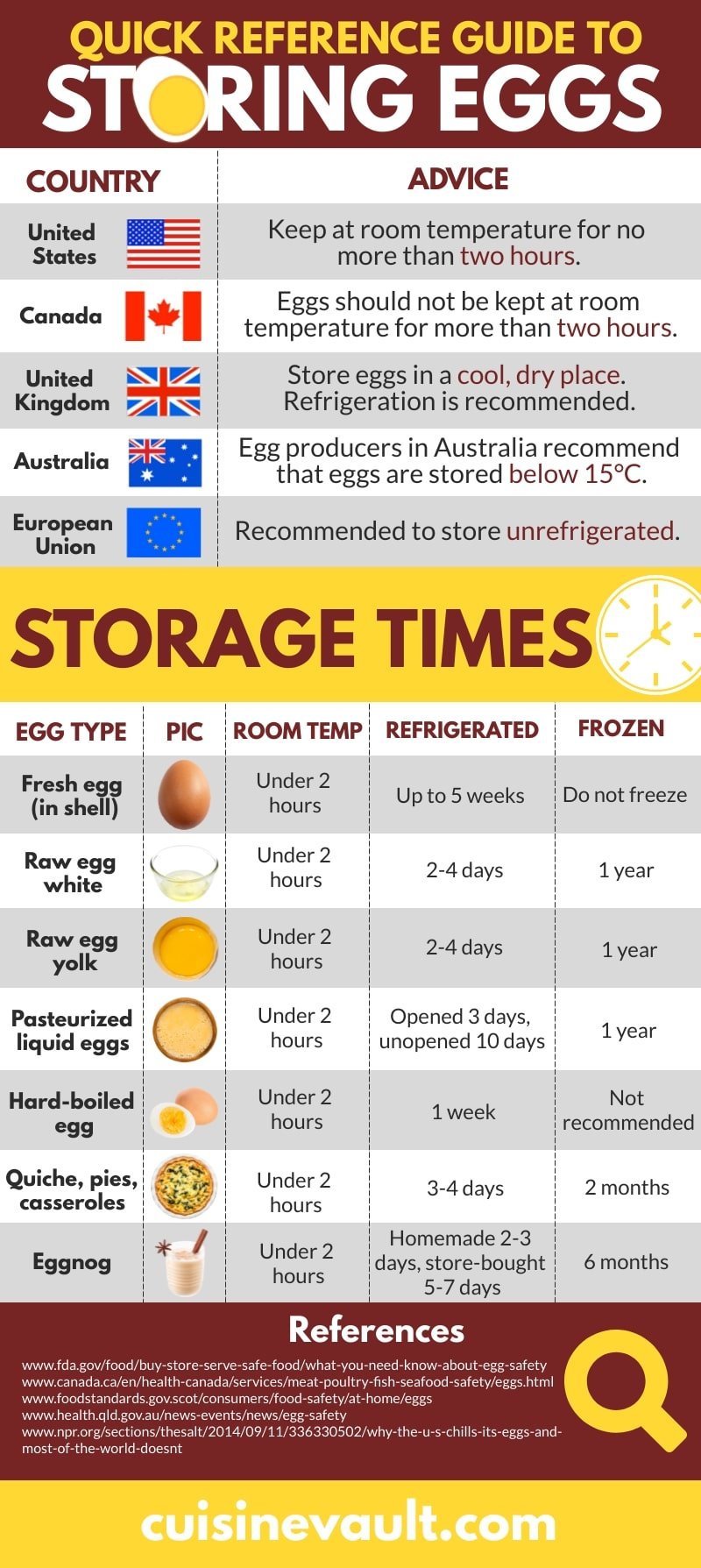Proper storage of eggs is important to help maintain their quality. It also reduces the chance of foodborne bacteria like salmonella. Food safety guidelines vary by country, so we got answers from a range of food authorities around the world. Keep reading to discover how long eggs can sit out and the safest way to store them.
Table of Contents
How long can eggs sit out of the fridge?
In the United States and Canada, raw eggs in their shells should be refrigerated within two hours of purchase. In the U.K, Australia, and New Zealand eggs can be stored out of the fridge, but if the temperature is above 15°C then refrigeration is recommended. In the E.U eggs can be stored at room temperature.
| Country | Advice | Reference |
|---|---|---|
| United States | Store promptly in a clean refrigerator at a temperature of 40° F or below. | [1] |
| Canada | Eggs should not be kept at room temperature for more than two hours. | [2] |
| United Kingdom | Store eggs in a cool, dry place. Refrigeration is recommended. | [3] |
| Australia | Most egg producers in Australia recommend that eggs are stored below 15°C. | [4] |
| European Union | Recommended to store unrefrigerated. | [5] |
How long can other types of eggs sit out?
Eggs aren’t necessarily whole - you may have egg whites, boiled eggs, or they could be an ingredient in another recipe. We’ve compiled the ultimate storage guide for eggs; a table that explains how long eggs last before going bad or losing quality.
| Type of Egg | Room Temperature | Refrigerated | Frozen |
|---|---|---|---|
| Fresh egg (in shell) | Under 2 hours | Up to 5 weeks | Do not freeze |
| Raw egg white | Under 2 hours | 2-4 days | 1 year |
| Raw egg yolk | Under 2 hours | 2-4 days | 1 year |
| Pasteurized liquid eggs | Under 2 hours | Opened 3 days, unopened 10 days | 1 year |
| Hard-boiled egg (peeled or in shell) | Under 2 hours | 1 week | Not recommended |
| Cooked dishes: quiche, pies, casseroles. | Under 2 hours | 3-4 days | 2 months |
| Drinks (like egg nog) | Under 2 hours | Homemade 2-3 days, store-bought 5-7 days | 6 months |
Are chicken eggs a risky food to eat?
The most common reason for foodborne illness is salmonella which is usually associated with eggs. There are roughly 1.2 million cases of nontyphoidal salmonellosis a year in the United States, with around 450 deaths. Taking care with egg storage is the best way to stay safe.
If you follow the recommended storage advice for eggs and properly cook them, you'll significantly reduce the chance of food poisoning. Although some foods have very flexible best before dates, we don't recommend storing eggs longer than the guidelines.
Interesting articles:
A handy guide on how to cook eggs the right way.
How long does cream cheese last?
How long can chicken sit at room temperature?
Why do some countries need to refrigerate eggs?
In some countries like the United States and Canada, fresh eggs are washed and sanitized once laid. This process makes it essential to keep the eggs chilled until needed. Removing from the fridge for too long can cause them to sweat and increase the chance of bacteria getting into the egg.
Alternatively, places like the United Kingdom don’t wash their eggs. Instead, farmers must keep the chicken’s habitat clean and they also vaccinate their hens against salmonella. This means their eggs can be sold unrefrigerated.
What if I have my own chickens?
If you have your own chicken coop, eggs can be stored at ambient (room) temperature as they haven’t been cleaned and will still have their bloom intact. Your eggs should last around two weeks on the counter, but they can last up to four if refrigerated.
- Try to collect the eggs twice a day to reduce the potential for bacteria growth.
- Label eggs with their collection date to avoid any confusion.
- Toss out cracked eggs or any that you discover in the coop which may have been lying there too long.
- Use a separate paper towel to clean feces or dirt from the shell. Avoid washing eggs as this will affect the integrity of the shell.

Hens running free in the back garden.
Worth a read:
How long is fish okay to sit out for?
How long do lemons last in water?
How long does sesame oil last?
Egg buying and storage tips
- Buy in-date, grade A/AA eggs, or market fresh eggs from reputable sellers.
- Make sure the eggs are refrigerated in store if you’re in a country that requires this.
- Avoid eggs with cracked or dirty shells. If you crack an egg on the way home, break it into an airtight container and store in the fridge for up to 2 days.
- Buy eggs just before heading home so that they aren’t kept at room temperature for too long.
- Store eggs in their original carton packaging to protect them from absorbing the aromas of other foods. Place at the back of the refrigerator to reduce temperature fluctuation.
How to safely handle eggs in the kitchen
- Always ensure eggs are completely cooked before serving.
- Wash hands before and after working with eggs to help avoid cross-contamination.
- Thoroughly wash your work area, dishes, utensils, and appliances with soapy, hot water before and after using eggs.
- If you’re making edible cookie dough, don’t use eggs.
- Recipes that contain egg, like quiche, should reach an internal temperature of 160°F.
- Serve eggs immediately after cooking or cool in a shallow dish before refrigerating.

Eggs last longer in the refrigerator.
Frequently asked questions
Do hard-boiled eggs spoil faster than fresh eggs?
Fresh eggs have a protective coating that helps them last up to five weeks refrigerated; once boiled, the protection is removed and the egg will only last one week refrigerated.
Can I eat eggs left in the car overnight?
Temperature fluctuation is risky for eggs, so if you’ve left them in the car overnight then you’re best to discard them. If you live in a cool climate, below 40°F, your risk is reduced.
Why do eggs carry salmonella?
The inside of an egg can become contaminated with salmonella before it is hatched by the chicken. Once the egg has been laid, droppings can also contaminate the outside of the shell.
How can I tell if an egg is fresh?
To check an egg’s freshness, pop it in a bowl of water. If it drops to the bottom, that’s a sign that it’s fresh. Older eggs will float to the top as it has had longer to form an air bubble in its base. Keep in mind that this test doesn’t check for foodborne bacteria, it is just testing the freshness.
Related reading:
How long can cookie dough sit out?
How long do tomatoes last?
How long do mushrooms last?
How long does Halloween candy last?

Summing up
Egg storage guidelines vary depending on the country. If you’re in the U.S or Canada, then get your eggs into the fridge as soon as you get home from the store. It isn’t recommended to leave them out for longer than two hours.
Although it’s possible to leave eggs at room temperature in some countries, we still recommend storing them refrigerated. This keeps them at a consistently cold temperature, and they’ll last a week or two longer.
References:
[1] https://www.fda.gov/food/buy-store-serve-safe-food/what-you-need-know-about-egg-safety
[2] https://www.canada.ca/en/health-canada/services/meat-poultry-fish-seafood-safety/eggs.html
[3] https://www.foodstandards.gov.scot/consumers/food-safety/at-home/eggs
[4] https://www.health.qld.gov.au/news-events/news/egg-safety
[5] https://www.npr.org/sections/thesalt/2014/09/11/336330502/why-the-u-s-chills-its-eggs-and-most-of-the-world-doesnt

Leave a Reply